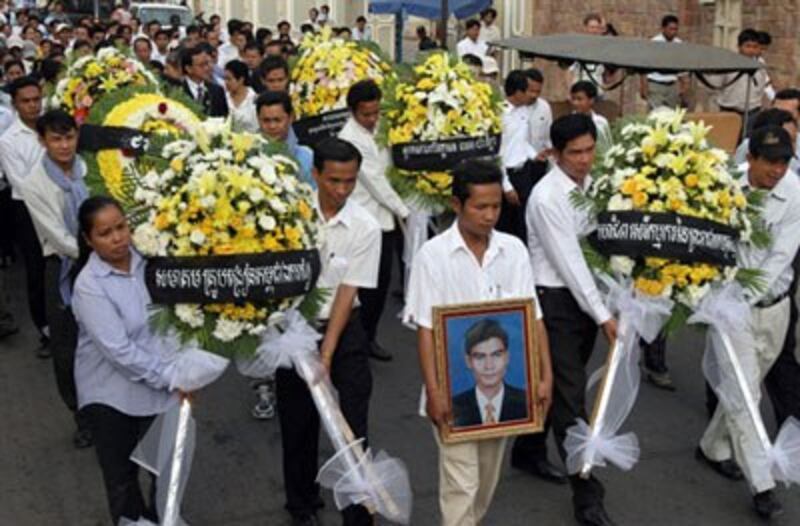Cambodia’s Supreme Court on Wednesday acquitted two men it said were wrongly convicted of the 2004 murder of outspoken labor leader and opposition supporter Chea Vichea, in a move widely welcomed by the country’s civil society organizations and the international community.
But the decision immediately led to calls from rights groups and Chea Vichea’s family for a reinvestigation of the case and to bring the true killers to justice.
Presiding Judge Khem Pon ordered the release of Sok Sam Oeun and Born Samnang—two men seen by rights groups as “scapegoats” for the crime—following a five-hour hearing at the nation’s top court in Phnom Penh, saying the evidence against them was lacking.
“The evidence provided by the police contradicted the testimony of the witnesses and the court has not provided any new evidence linking the pair with the crime,” Khem Pon said in his verdict, prompting cheers from supporters and shouts of thanks from the two men to the panel of nine court judges.
Sok Sam Oeun told reporters after the trial that the acquittal had given him hope in the country’s judicial system.
“There is justice in Cambodia today, now that the court has released me,” he said.
Sok Sam Oeun's lawyer Hong Kim Soun applauded Wednesday’s “just verdict” but blamed the authorities who had arrested his client and the Phnom Penh court that jailed him for six years. He said he would discuss with Sok Sam Oeun the possibility of pursuing lawsuits against the authorities.
Labor leader killed
Chea Vichea, the former president of Cambodia’s Free Trade Union (FTU)—one of the biggest unions in the country—was shot to death on Jan. 22, 2004 by an unknown assailant while he read a newspaper at a stand in Phnom Penh.
Sok Sam Oeun and Born Samnang were arrested within days and were each handed 20-year jail sentences in a 2005 trial decried by rights groups as unjust. The two men maintained that they had been framed by the police.
In 2008, the Supreme Court ordered a reinvestigation that led to their release on bail from 2009-2012, but they were ordered jailed again when the Appeal Court upheld the original sentence.
The two men had each spent nearly five years in prison for the crime before Wednesday’s verdict.
Chea Vichea founded the FTU along with president of the opposition Cambodia National Rescue Party Sam Rainsy and had tirelessly campaigned on behalf of Cambodia’s garment workers.
Rights groups have said that his murder highlights a culture of impunity in Cambodia, where a number of members of the media, rights campaigners, and opposition leaders have been targeted for assassination, though the perpetrators have never been found.

Verdict welcomed
The Supreme Court decision was welcomed by the FTU’s current president, the brother of Chea Vichea, Chea Mony, though he said that he and his family would not rest until the killers were made to pay for their crime.
“We have not received justice because the court has not yet sentenced the true perpetrators,” he said.
Local rights groups Cambodian Center for Human Rights (CCHR), Cambodian Human Rights Action Committee (CHRAC), and Cambodian Human Rights and Development Association (ADHOC) also applauded the court verdict in a joint statement issued Wednesday.
“It has been clear from the outset that Born Samnang and Sok Sam Oeun were scapegoats in this case,” the statement said, noting that while the two men had not been granted compensation for the years they spent in prison, the atmosphere in the courtroom following the decision was “jubilant.”
“However, although today’s decision represents a victory of sorts for the two accused, justice for Chea Vichea remains elusive. His real killers remain at large, and the Cambodian authorities must reinvestigate the case in order to demonstrate that impunity does not reign in Cambodia.”
Judicial ‘deficiencies’
The Office of the United Nations High Commissioner for Human Rights (OHCHR) and the International Labour Office (ILO) said in a statement that the decision showed that the court had identified “deficiencies” in the way police handled the case.
“While the ILO ... and the OHCHR welcome the acquittal and imminent release of the two men, they recall the emphasis placed by international supervisory bodies on the needs for a full investigation into the murder of Chea Vichea in order to ensure that the real perpetrators are prosecuted, tried and punished,” the statement said.
Ahead of Wednesday’s trial, New York-based Human Rights Watch had called on Cambodia’s government to drop its case against the two men, with Asia director Brad Adams noting that the country’s judicial officials had acknowledged to his organization that their “conviction was the result of a high-level political decision, contrary to the facts of the case and applicable law.”
He said the case would be a test of whether the country’s courts will “continue to be a political tool of Prime Minister Hun Sen.”
Reported by RFA’s Khmer Service. Translated by Samean Yun. Written in English by Joshua Lipes.
